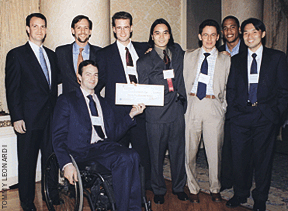
Ever heard of eTechtransfer.com? No? Well, if you’re in the life-sciences industry, chances are you will. It’s a global B2B (business-to-business) marketplace for technology transfer in the life sciences, and its online transaction engine “will reduce costs and maximize the efficiency of your licensing and partnering efforts,” in the words of its Web site. How about NovaEx.com? That’s an “e-marketplace for natural products,” according to founder Adam Zong WG’00, who notes that those products include “nutraceuticals, dietary supplements, herbal products, natural foods, natural personal-care products and other related raw materials and intermediates”—and that the company is “looking to expand globally in the summer.” Or Digipad? It produces patient-interview software and supplies it to doctors via the Internet.
Those three start-up ventures were the big winners in the second annual Wharton Business Plan Competition, though they were by no means the only promising business plans put together by students from across the University. Of the 226 plans submitted, 25 made it to the semifinal stage, and another eight made it to the final round. According to Mark Fraga, managing director of Wharton Entrepreneurial Programs and the self-described “staff vehicle” for bringing the competition to fruition, all eight finalists were “very serious businesses”—as, for that matter, were the 25 semifinalists’ plans.
At stake was a total of $75,000 in prize money, not to mention the prestige and potential leverage that comes with winning. The grand-prize winner, eTechtransfer.com, took home $25,000 ($15,000 in cash and a $10,000 investment in the company, courtesy of Safeguard Scientifics, a Pennsylvania-based venture-capital firm); the new company was also offered a $15,000 convertible loan from the Paul P. Dosberg Foundation.
Headed by Yujiro Hata WG’01, eTechtransfer.com has 15 employees in its Philadelphia office. So far, it has completed a first version of its software; put together an advisory board; and struck partnerships with several Internet life-sciences companies. NovaEx.com won the $15,000 E*Entity E-commerce Prize and a $10,000 convertible loan from the Dosberg Foundation. And Digipad, the competition’s silver-award winner, received a $10,000 cash prize.
According to Fraga, the real impetus for the competition came from students. “It was student-created and student-run,” he says. “It’s a great idea that was waiting to happen—and needed to happen.”
The philosophy behind it, he adds, is two-fold: “One is to encourage students across the whole University—not just Wharton —to toss their hats in the ring and try out the fun and challenge of starting a new business. The other is to help students access the resources that will support them in launching new ventures, including drawing on the resources on campus and engaging with the entrepreneurial business community.”
Since all businesses and would-be businesses are “starved for cash at an early stage,” the prize money is “certainly encouraging,” he notes. In addition to the infusion of dollars, Fraga says that winning “gives them bragging rights—like a Good Housekeeping Seal of Approval —and enables them to tell investors that they were the cream of the crop.” Finally, he points out, “the feedback from the judges and a chance to engage with them is very valuable.”
NovaEx.com’s Adam Zong agrees that going through the various stages of the competition “gave us a chance to really formulate and organize our thoughts,” and that winning “adds a lot of credibility.” While turnout at the final presentation “wasn’t so good,” he says, a strong showing “opens a lot of doors and puts [the plan] in front of a lot of potential investors—some famous investment banks and venture-capital funds.” Having incorporated in January, NovaEx.com now has seven employees, including some seasoned industry leaders, and plans to expand into Europe, Asia and Latin America this summer—assuming that the market, which turned bearish in the spring, doesn’t scare away all the venture capitalists.
Digipad’s Brent Chinn, a first-year MBA student at Wharton, says that participating in the competition was a “great experience and a great way for us to validate that we had a good idea,” adding: “We are currently looking for angel investors with a specific interest in health-care related businesses to help fund Phase I of our plan, which includes testing the product in over 500 physician offices which we have access to. We plan to roll out to over 25 physicians’ offices by October. We also hope to form relationships at the University to beta-test our product at the medical school.”
According to Fraga, three of the six finalists who are going forward with their ideas are launching in Philadelphia, which is good news for the city. “The competition may help some of the best and brightest decide to stay in Philadelphia. And I think that benefits all of us.”
The fact that virtually all of the winners were e-businesses, and that the majority of them were of the B2B variety, does not surprise Fraga. “Even with the market tanking,” he says, “that’s where students see revolutionary, scaleable opportunities” for their entrepreneurial energy. But, he adds, “it will be interesting to see how that sustains itself over the next year.”

